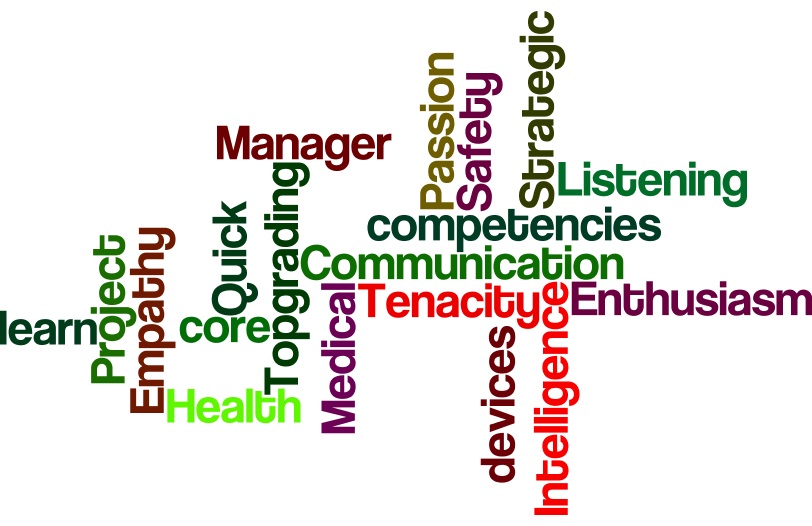
Core competencies of a medical device project manager
I was introduced recently to the concept of Topgrading hiring methodology in our search for more medical device Project Managers at StarFish. These are talented folks that thrive in challenging, high-paced, and innovative environments.
In preparation for interviewing our candidates, I was asked to prepare the Topgrading Job Scorecard. Lucky for me, a colleague recently completed Topgrading training and walked me through the steps to building our custom Scorecard.
Part of the Topgrading process is identifying core competencies vital to the role. Starting from a list of 50 competencies, I had to choose the top 10-15 that exemplify a Project Manager. Some of these competencies are flagged as “easy to change or learn” and others as “very difficult to change or learn”. Obviously, you want a candidate that fully meets the hard to change competencies. More on the top grading philosophy can be found here.
So what are the core competencies of a medical device project manager?
That was the interesting part of this exercise. At first blush, one might choose communication, organization, negotiation skills, detail-oriented — all these elements certainly make up a solid PM.
Pause for a moment. Medical devices and specifically, the product development services we provide to our clients are special. As most any PM will attest, timelines are aggressive, budgets are tight, and quality and innovation are vital to the successful launch of a new or improved product.
But what makes medical device development special? Health and Safety.
Medical devices address a real clinical need. That means a certain trust and vulnerability is placed in our hands by the doctors, nurses, and patients who will ultimately use the microprocessors, sensors, software, and plastics we develop.
Due to this special role we play, the leadership characteristics of a medical device Project Manager also take on an interesting shape. I’ve bundled these unique characteristics into a few categories that (I think) exemplify the best project leaders and product champions in medical device development:
Empathy, Communication, Listening – The voice of the customer is complex and multi-layered in medical devices. Sensitivity and intuition are necessary to capture the real needs of the patient, doctor, or nurse who will ultimately use the device or technology we develop. Skills are needed to effectively listen to the client, clinical advisors, and end users, synthesize that information, and dig deeper to develop a safe, effective, and meaningful solution. A common example of this is conflicting user perspectives, sometimes from within the same operating room, when a surgeon, sterile nurse and circulating nurse must all interface with the same piece of equipment.
Intelligence, Quick to learn, Strategic– Creating something that has never been made before is wrought with discovery — that’s part of the fun! No matter how stacked your bench of experts may be, something new is always uncovered; a test fails; a spec pushes the envelope of achievable. If it was easy, everyone would do it. The point is to learn those new things fast, and use that information to make good decisions along the way. The innovation road is rocky and it is our job to spot the big boulders a mile ahead. An example of this was our experience in developing a novel in vivo sensing platform. We realized the technology was not achieving the target results, so we refined our approach, looked broadly and turned the platform into a successful future device with countless applications.
Enthusiasm, Passion, Tenacity – Clients approach us with an idea, or perhaps even a series of prototypes that demonstrate their core technology. Funding for those ideas comes in many forms and so do our clients: entrepreneurs, doctors, scientists, R&D directors, etc. Our clients have a passion and personal vested interest in making their product a success. Each carries a vision to improve standard of care, medical practice and well-being. We have an opportunity to help fulfill that vision by driving forward a novel and needed technology. We become an extension of our client’s vision and team – and with that must match the fervour for realizing their dream. I do not have one example that conveys this spirit adequately; it is simply a palpable energy when you walk in the door of our studio.
I am interested to hear more on your experience using Topgrading for recognizing talent and identifying roles in medical device development. What makes for a skilled project leader in medical devices? Please share your thoughts and commentary with us!
Heidi Giesbrecht, MEng is a former StarFish Medical Project Manager, PMO and cross-functional leader in medical device development. Heidi’s passion for continuous improvement, Agile, and expertise in managing medical device design and commercialization mesh perfectly with Topgrading. Heidi proposed the name Astero chosen by employees to personify the StarFish star.
Image: http://www.edwordle.net/
